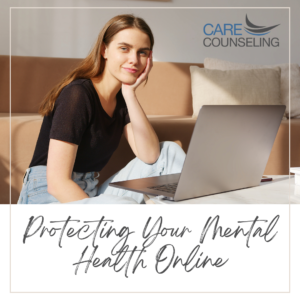Mindful Social Media Use
 Social media has become an integral part of our daily lives, offering a platform for connecting with friends, sharing experiences, and staying informed. However, the constant barrage of notifications, comparisons, and curated content can take a toll on your mental health if not used mindfully. In this blog post, we’ll explore the importance of mindful social media use and provide strategies to protect your mental well-being while navigating the digital landscape.
Social media has become an integral part of our daily lives, offering a platform for connecting with friends, sharing experiences, and staying informed. However, the constant barrage of notifications, comparisons, and curated content can take a toll on your mental health if not used mindfully. In this blog post, we’ll explore the importance of mindful social media use and provide strategies to protect your mental well-being while navigating the digital landscape.
Understanding the Impact of Social Media on Mental Health
Before delving into mindful social media use, it’s essential to recognize the potential effects that excessive or unreflective use can have on your mental health:
- Social Comparison: Scrolling through carefully curated feeds can lead to unhealthy social comparisons, where you measure your life against others’ highlight reels.
- Anxiety and Depression: Studies have shown a correlation between heavy social media use and symptoms of anxiety and depression, particularly among young adults.
- Reduced Self-Esteem: Frequent exposure to idealized images and lifestyles can contribute to low self-esteem and feelings of inadequacy.
- Fear of Missing Out (FOMO): Constantly checking social media to avoid missing out on updates or events can lead to anxiety and distract from in-the-moment experiences.
- Cyberbullying: Online harassment and cyberbullying can cause significant emotional distress and harm.
Given these potential risks, it’s crucial to approach social media with mindfulness to protect your mental health.
Practicing Mindful Social Media Use
- Set Boundaries
Establish clear boundaries for your social media use. Designate specific times of day for checking your accounts and stick to them. Avoid scrolling through social media right before bed or immediately upon waking, as this can disrupt your sleep and set a negative tone for the day.
- Audit Your Following List
Regularly review and curate your list of friends or accounts you follow. Unfollow or mute accounts that consistently make you feel negative emotions or trigger comparison. Your social media feed should inspire and uplift you, not cause stress or envy.
- Be Selective About Notifications
Turn off non-essential notifications on your devices. The constant ping of notifications can create a cycle of distraction and anxiety. Choose to receive notifications only for essential messages or events.
- Practice Digital Detox
Take occasional breaks from social media. Consider implementing a “digital detox” day or weekend where you disconnect from all social platforms. This break can help you regain perspective and reset your relationship with social media.
- Limit Scrolling Time
Set a timer when you use social media to avoid aimless scrolling. Limit your daily or weekly scrolling time to a manageable amount. Once the timer goes off, close the app and move on to other activities.
- Engage Mindfully
When you do use social media, engage mindfully. Pay attention to how you feel while scrolling and ask yourself if the content you’re consuming is adding value to your life. Share meaningful posts and engage in positive interactions with others.
- Practice Gratitude
Cultivate gratitude for the positive aspects of your life. Social media can sometimes overshadow the good things by emphasizing what’s missing or what others have. Take time to reflect on the things you’re grateful for outside of the digital world.
- Manage FOMO
Address the fear of missing out by recognizing that social media often presents an idealized version of reality. What you see online is only a small fraction of someone’s life. Focus on the present moment and the relationships you have offline.
- Report and Block
If you encounter cyberbullying, harassment, or harmful content, report it immediately and block the user responsible. Your mental health and safety should always come first.
- Connect Authentically
Engage in meaningful conversations and connections online. Share your authentic experiences and support others who do the same. Building a genuine online community can contribute positively to your mental well-being.
Social media can be a powerful tool for connection, inspiration, and information. However, mindful social media use is essential to protect your mental health in an increasingly digital world. By setting boundaries, curating your online environment, and practicing mindfulness, you can enjoy the benefits of social media while minimizing its potential negative impacts.



























